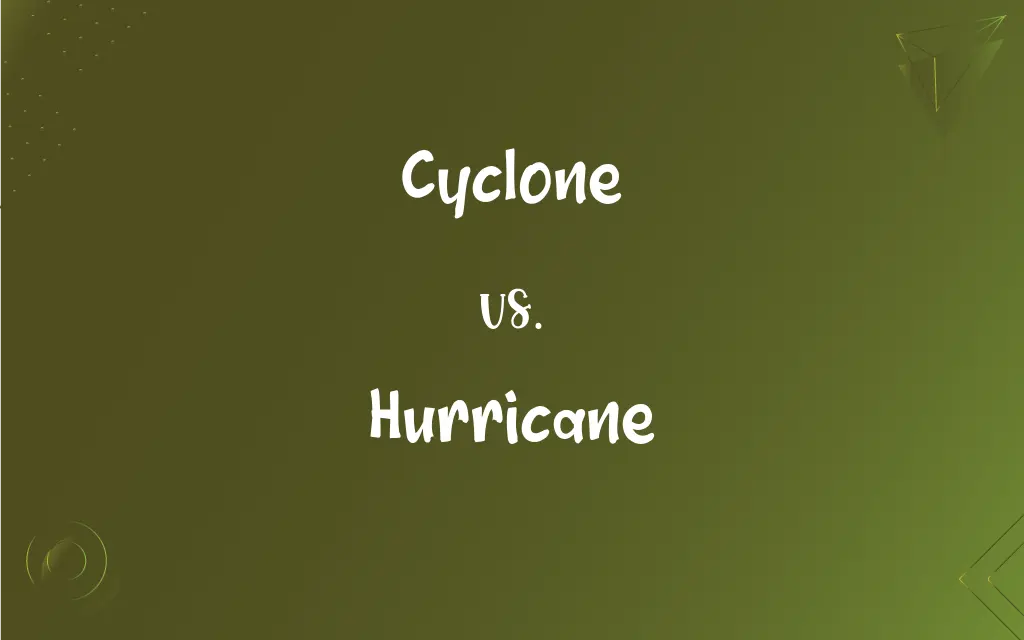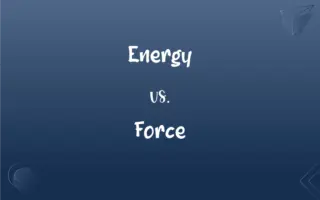Cyclone vs. Hurricane: What's the Difference?
Edited by Aimie Carlson || By Harlon Moss || Published on January 11, 2024
A cyclone is a rotating storm system occurring in various parts of the world, while a hurricane is a specifically named cyclone occurring in the Atlantic and northeastern Pacific.

Key Differences
Cyclones and hurricanes are both types of intense tropical storms with strong winds and heavy rain. A cyclone is a general term used for a weather system in which winds rotate inward to an area of low atmospheric pressure. In contrast, the term hurricane is specifically used for such storms in the Atlantic Ocean and northeastern Pacific Ocean.
The term cyclone is used in various regions, including the Indian Ocean and South Pacific. Hurricanes, on the other hand, refer to the same phenomenon but are specific to the Atlantic and northeastern Pacific regions. The primary difference lies in the location, not in the nature of the storm.
Both cyclones and hurricanes form over warm tropical waters and gain energy from the ocean's warmth. Cyclones in the Southern Hemisphere rotate clockwise, while hurricanes in the Northern Hemisphere rotate counterclockwise. This difference is due to the Coriolis effect.
When a cyclone reaches wind speeds of 74 mph or more, it is classified as a tropical cyclone, typhoon, or hurricane based on its location. Hurricanes are categorized from Category 1 to 5 on the Saffir-Simpson scale, which measures wind speed and potential damage.
The term cyclone encompasses a broader range of storm systems, including tropical cyclones, typhoons, and hurricanes, depending on the region. In contrast, a hurricane is a more specific term used only for strong tropical cyclones in certain geographic areas.
ADVERTISEMENT
Comparison Chart
Geographical Occurrence
Indian Ocean, South Pacific
Atlantic, Northeastern Pacific
Rotation Direction
Clockwise in Southern Hemisphere, Counterclockwise in Northern Hemisphere
Counterclockwise
Naming Convention
Cyclone, Typhoon (Western Pacific)
Hurricane
Classification Scale
Various regional scales
Saffir-Simpson Hurricane Wind Scale
General Definition
A rotating storm system
A specifically named cyclone in certain regions
ADVERTISEMENT
Cyclone and Hurricane Definitions
Cyclone
A system of winds rotating inward to an area of low barometric pressure.
Meteorologists warned of a cyclone developing over the ocean.
Hurricane
A tropical cyclone with winds of 74 miles per hour or higher, typically occurring in the Atlantic.
The hurricane caused unprecedented damage along the coastline.
Cyclone
A large scale air mass rotating around a strong center of low atmospheric pressure.
The cyclone caused extensive flooding in the coastal regions.
Hurricane
An intense tropical weather system with a well-defined circulation.
The hurricane's path was tracked closely by meteorologists.
Cyclone
A natural disaster involving a rotating storm system.
Relief efforts were mobilized after the cyclone hit the area.
Hurricane
A powerful storm characterized by a low-pressure center, spiral arrangement of thunderstorms producing high winds and heavy rain.
Emergency services were on high alert during the hurricane.
Cyclone
A weather phenomenon characterized by heavy rain and strong winds.
The cyclone disrupted air travel and grounded flights.
Hurricane
A severe tropical storm with powerful winds and heavy rain.
Residents boarded up their homes as the hurricane approached.
Cyclone
A violent tropical storm with winds blowing in a circular motion.
Villages were evacuated in anticipation of the approaching cyclone.
Hurricane
A type of tropical cyclone forming in the Atlantic or northeastern Pacific Ocean.
The city was evacuated due to the approaching hurricane.
Cyclone
An atmospheric system characterized by the rapid inward circulation of air masses about a low-pressure center, usually accompanied by stormy, often destructive weather. Cyclones circulate counterclockwise in the Northern Hemisphere and clockwise in the Southern Hemisphere.
Hurricane
A severe tropical cyclone having winds greater than 64 knots (74 miles per hour; 119 kilometers per hour), originating in the equatorial regions of the Atlantic Ocean or Caribbean Sea or eastern regions of the Pacific Ocean, traveling north, northwest, or northeast from its point of origin, and usually involving heavy rains.
Cyclone
A violent tropical storm, especially one originating in the southwestern Pacific Ocean or Indian Ocean.
FAQs
Are cyclones and hurricanes the same?
Yes, they are similar phenomena but named differently based on their location.
What is the scale for measuring cyclones?
It varies by region, including the Australian and Fiji scales.
What scale is used for hurricanes?
The Saffir-Simpson Hurricane Wind Scale.
Can cyclones occur in both hemispheres?
Yes, with different rotation directions in each.
Where do hurricanes occur?
In the Atlantic Ocean and northeastern Pacific.
How do cyclones form?
From warm ocean waters and atmospheric disturbances.
What is a cyclone?
A rotating storm system characterized by low pressure, strong winds, and heavy rain.
What is a hurricane?
A severe tropical storm in the Atlantic or northeastern Pacific, with winds exceeding 74 mph.
Where do cyclones occur?
Mainly in the Indian Ocean and South Pacific.
How long can hurricanes last?
They can last from a few days to over a week.
What causes hurricanes?
They form over warm ocean waters, driven by atmospheric instability.
What should one do to prepare for a hurricane?
Similar to cyclones, including securing homes, following evacuation orders, and having a disaster kit.
What are the impacts of hurricanes?
Similar to cyclones, including wind damage, flooding, and storm surges.
How are cyclones named?
By regional meteorological organizations, following specific naming lists.
How are hurricanes named?
By the World Meteorological Organization using predetermined lists.
Do hurricanes only occur in the Northern Hemisphere?
Primarily, but similar storms in the Southern Hemisphere are called cyclones or typhoons.
What damage can cyclones cause?
Extensive damage from winds, flooding, and landslides.
How long do cyclones last?
Typically a few days, but can vary greatly.
Can we predict cyclones?
Yes, with increasing accuracy due to advanced meteorological technology.
Are hurricanes predictable?
Yes, but their paths and intensities can vary, making precise predictions challenging.
What preparations are needed for a cyclone?
Evacuation plans, securing property, and having emergency supplies.
About Author
Written by
Harlon MossHarlon is a seasoned quality moderator and accomplished content writer for Difference Wiki. An alumnus of the prestigious University of California, he earned his degree in Computer Science. Leveraging his academic background, Harlon brings a meticulous and informed perspective to his work, ensuring content accuracy and excellence.
Edited by
Aimie CarlsonAimie Carlson, holding a master's degree in English literature, is a fervent English language enthusiast. She lends her writing talents to Difference Wiki, a prominent website that specializes in comparisons, offering readers insightful analyses that both captivate and inform.































































